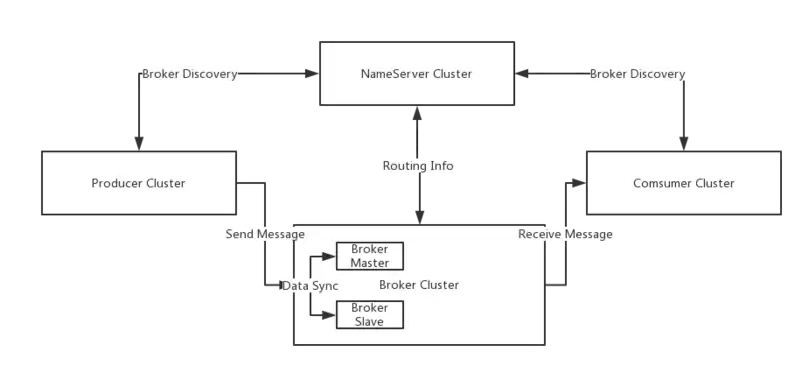Apache RocketMQ
RocketMQ[2] is a distributed messaging and streaming platform with low latency, high performance and reliability, trillion-level capacity and flexible scalability. It is the third generation distributed messaging middleware open sourced by Alibaba in 2012. On November 21, 2016, Alibaba donated RocketMQ to the Apache Software Foundation. Next year, on February 20, the Apache Software Foundation announced Apache RocketMQ as a Top-Level Project.
 | |
| Developer(s) | Apache Software Foundation |
|---|---|
| Initial release | 2012 |
| Stable release | 5.0.0
/ September 9, 2022[1] |
| Repository | RocketMQ Repository |
| Written in | Java |
| Operating system | Cross-platform |
| Type | Stream processing, Message broker |
| License | Apache License 2.0 |
| Website | rocketmq |
History
The development of RocketMQ can be divided into three stages.[3]
The first generation uses the push mode in data transportation, and relational database in data storage. It shows low latency in message delivery and meets the command of a typical E-commerce platform[4] with distributed transactions.
The second generation uses the pull mode in data transportation, and file system in data storage. It paid more attention to stability and reliability, and shows a comparable performance to the first generation in response time and Kafka on log collection.
The third generation combines the Pull mode with some Push operations. It inherits the advantages of the first and second generation, and shows high performance in concurrency and massive amounts of data scenarios.
Features
Much comparison have been made between the various messaging solutions, and it is widely known that when the number of topics increases dramatically, the throughput of RocketMQ dropped much less than Kafka.[5] Because the characteristics of high performance, high reliability and high real-time ability, more and more efforts have been made to the combination of RocketMQ and other protocol components in every type of messaging scenarios such as MQTT.[6]
| Client SDK | Protocol and Specification | Ordered Message | Scheduled Message | Batched Message | BroadCast Message | Message Filter | Server Triggered Redelivery |
|---|---|---|---|---|---|---|---|
| Java, C/C++, Python, Go, Nodejs | Pull model, support TCP, JMS, OpenMessaging | Ensure strict ordering of messages, and can scale out gracefully | Supported | Supported, with sync mode to avoid message loss | Supported | Supported, property filter expressions based on SQL92 | Supported |
| Message Storage | Message Retroactive | Message Priority | High Availability and Failover | Message Track | Configuration | ||
| High performance and low latency file storage | Supported timestamp and offset two indicates | Not Supported | Supported, Master-Slave model, without another kit | Supported | Work out of box,user only need to pay attention to a few configurations |
Architecture

RocketMQ consists of four parts: name servers, brokers, producers and consumers. Each of them can be horizontally extended without a single point of Failure. As shown in image left.
NameServer Cluster
The lightweight component for service discovery and they can be used to read and write routing information. Each one records global information, and supports fast storage expansion.
Broker Cluster
They use lightweight TOPIC and QUEUE mechanisms to manage data storage. To realize fault tolerance, two copies or three copies of data are provided. And Client can get message in Push and Pull model. In addition, disaster recovery and rich metrics statistics are also supported.
Producer Cluster
Producers can be distributed deployed, and messages from producers to brokers can be balanced through multi-path. In addition, fast failure and low latency are supported.
Consumer Cluster
Consumers can also be distributed deployed in the push and pull model, and they can subscribe message real-time, consume message in the unit of cluster. Message broadcasting is also supported.
Applications
There are at least five aspects Apache RocketMQ could relate to:
- The integration of heterogeneous systems;
- Decoupling between applications;
- Backbone in the event-driven mechanism and complex event architecture model;
- Data replication channels;
- Integration with flow calculation engine;
- Stream data access.
Community Maintenance
The RocketMQ team have done much to active the community. Meetups, Workshops, ApacheCon and Code Marathon are regular held in Beijing, Shenzhen and Hangzhou to attract new contributors and committers. The OpenMessaging benchmarking suites are currently available for the RocketMQ and it makes RocketMQ keep the pace with the global standard for distributed messaging.[7] As for version management, a series of standardized software development processes are adopted. The latest version is 4.2.0, and 4.3.0 is on the way. More information can be reached in here.
Awards
2016 China's most popular open source software award
2017 China's most popular open source software award Archived 2018-06-19 at the Wayback Machine
16th CJK(China-Japan-South Korea) open source software outstanding technology award
2018 China's most popular open source software award Archived 2019-01-02 at the Wayback Machine
See also
References
- "Release Notes - Apache RocketMQ - Version 5.0.0". Retrieved 27 September 2022.
- "apache/rocketmq". GitHub. Retrieved 2018-05-25.
- "From Alibaba to Apache: RocketMQ's Past, Present, and Future". InfoQ. Retrieved 2018-06-26.
- Liao, Jianwei; Zhuang, Xiaodan; Fan, Renyi; Peng, Xiaoning (2017). "Toward a General Distributed Messaging Framework for Online Transaction Processing Applications". IEEE Access. 5: 18166–18178. doi:10.1109/ACCESS.2017.2717930.
- Cloud, Alibaba (2018-01-04). "Kafka vs. RocketMQ- Multiple Topic Stress Test Results". Medium. Retrieved 2018-07-08.
- Yue, Ma; Ruiyang, Yan; Jianwei, Sun; Kaifeng, Yao (2017). "A MQTT Protocol Message Push Server Based on RocketMQ". 2017 10th International Conference on Intelligent Computation Technology and Automation (ICICTA). pp. 295–298. doi:10.1109/ICICTA.2017.72. ISBN 978-1-5386-1230-9. S2CID 28825800.
- "The OpenMessaging Benchmark Framework". openmessaging.cloud. Retrieved 2018-07-08.